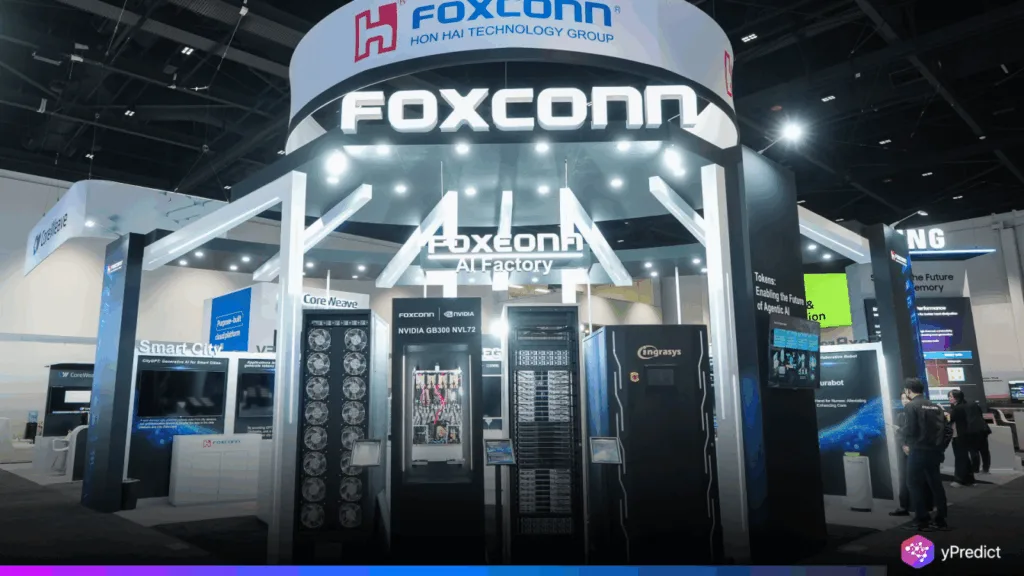
Foxconn’s subsidiary, Ingrasys Technology, will lease an eight-floor facility in Taoyuan’s Farglory Free Trade Zone for NT$657 million (US$22.8 million). The 60-month lease is part of Foxconn’s aggressive expansion of its AI server production capacity. Alongside operations in Luzhu and Hukou, this move strengthens Taiwan’s role in the global AI supply chain. Earlier this year, Foxconn invested US$142 million in a facility in Houston, Texas, and acquired another in Sunnyvale, California. With manufacturing also spanning Mexico and Vietnam, the company expects AI server revenues to grow over 50% in 2025. Potentially exceeding NT$1 trillion (US$34.7 billion).
Foxconn’s Strategic Shift to AI Servers
Hon Hai Precision has long been reliant on Apple for over half of its revenue. Deliberately pivoting toward AI infrastructure to counter weakening smartphone demand. This shift comes amid declining returns on invested capital, dropping from 23% in 2016 to 11% in 2023, as traditional assembly profits thin out. By prioritizing AI server manufacturing, the company aims to capture high-value opportunities in next-generation computing. The projected NT$1 trillion in AI server revenue for 2025, with more than 50% growth year-over-year, signals the gravity of this shift.
The Foxconn evolution from plastic parts manufacturing in 1974 to becoming the world’s top electronics manufacturer shows its ability to adapt at inflection points. The current AI wave presents another such moment, and the company is moving fast. Facilities in the U.S., Taiwan, Mexico, and Vietnam are being integrated into a broader, more resilient production network. This transition also supports Foxconn’s position in NVIDIA’s critical partner ecosystem. With AI hardware demand surging globally, the Foxconn early moves may help cement its leadership in a rapidly transforming sector, away from traditional tech assembly toward AI-centric engineering. Ingrasys is leading many of these developments.
Taiwan’s Role in Global AI Manufacturing
Taiwan is emerging as a key player in the global AI infrastructure race. The country’s industrial output grew 5.07% year-over-year, which is led by a 16.67% surge in electronic components. This growth is largely fueled by soaring global demand for AI hardware and high-performance computing equipment. Taiwan’s 2024 exports to the U.S. jumped by 46% to US$111.3 billion, a huge portion attributed to data center equipment tied to the AI boom.
Companies like Foxconn are at the center of this surge, supplying AI server systems to major U.S. tech firms and chipmakers like NVIDIA. The domestic ecosystem’s strength, from chip design to systems integration, gives Taiwan a unique edge. Despite geopolitical tensions and global trade headwinds, international firms are doubling down on R&D investments and data hubs across Taiwan. The total amount of revenues at Foxconn in Q1 2025 had already reached NT$1.64 trillion, which was an increase of 24.2 percent.
It is evident that the momentum of the industrial trend of AI manufacturing. With AI transforming how technology is stacked around the world, Taiwan is leveraging its leadership in semiconductors to take a larger role in the production of servers and smart infrastructure, which makes it the new epicenter of the AI hardware supply chain. Not only does this give Taiwan a diversified industrial base, but it also makes sure that it is more strategically relevant in the global tech map.
Diversification to Reduce Risk
Hon Hai’s strategy includes spreading AI server manufacturing across the U.S., Mexico, Vietnam, and Taiwan. A recent US$142 million Texas investment demonstrates its intent to build regional supply chains that lower exposure to tariffs and geopolitical risk. Rising U.S. tariffs on server imports have prompted this realignment. While customer demand increasingly favors localized production. Vietnam and India are also growing as alternative manufacturing bases. Chip makers face a huge surge in demand of AI hardware, and diversification of the geographic location is not only a cushion but it is also a mandatory requirement to win the game. The establishment of capacity across regions makes the company flexible, strong, and closer to its global customers.






